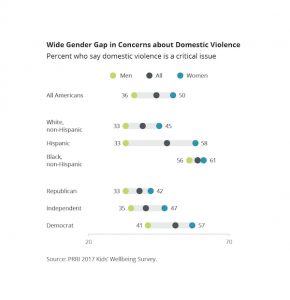October 2017 marks the 30th anniversary of Domestic Violence Awareness Month. A PRRI survey released in September 2017 finds that fewer than half (44 percent) of all Americans view domestic violence as a critical issue to them personally. Forty-five percent say it is one among many important issues, while about one in ten (11 percent) say that domestic violence is not that important an issue.
Women are far more likely than men to prioritize the issue of domestic violence—perhaps not surprisingly given that intimate partner violence disproportionately affects women. 1Half (50 percent) of women say domestic violence is a critical issue to them, compared to about one-third (36 percent) of men. Men are more than three times as likely as women to say domestic violence is not an important issue (17 percent vs. 5 percent, respectively).
Concerns about domestic violence also vary along racial, ethnic, and educational lines. Nearly six in ten (59 percent) black Americans say that domestic violence is a critical issue to them, compared to fewer than half (48 percent) of Hispanic Americans and only 39 percent of white Americans. Among whites, there are substantial divisions by educational attainment. A majority (51 percent) of whites with a high school degree or less say domestic violence is a critical issue to them personally, compared to fewer than three in ten (27 percent) whites with a four-year college degree.

No group shows greater personal concern about domestic violence than black women. 2 More than six in ten (61 percent) black women say domestic violence is a critical issue to them personally, compared to 58 percent of Hispanic women and only 45 percent of white women. Black men (56 percent) are about as likely as black women to say domestic violence is a serious issue. Substantially fewer white men (33 percent) and Hispanic men (33 percent) express this degree of concern about domestic violence. However, white men are twice as likely as Hispanic men to say that domestic violence is not that important an issue (20 percent vs. 10 percent, respectively).
The gender gap varies significantly by party affiliation. Republican women are somewhat more likely than Republican men to prioritize the issue of domestic violence. Forty-two percent of Republican women, compared to one-third (33 percent) of Republican men, say it’s a critical issue. There is a yawning divide among Democrats. A majority (57 percent) of Democratic women say domestic violence is a critical concern while only 41 percent of Democratic men say the same.
Endnotes
1According to recent CDC data, nearly one in four women and one in seven men have experienced severe physical violence by an intimate partner in their lifetime.
2This aligns with national data on intimate partner violence from the National Resource Center on Domestic Violence, via the Oregon Department of Justice. African-American women experience intimate partner violence at a rate 35 percent higher than white women.